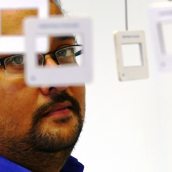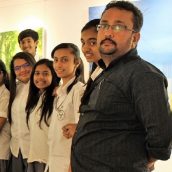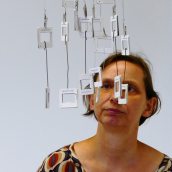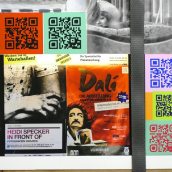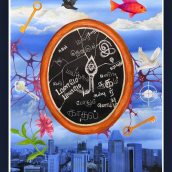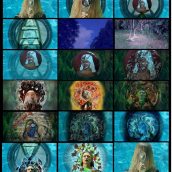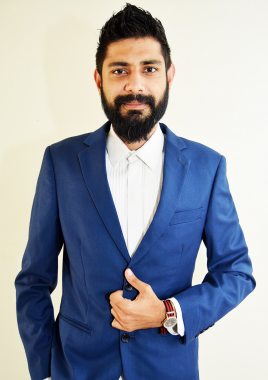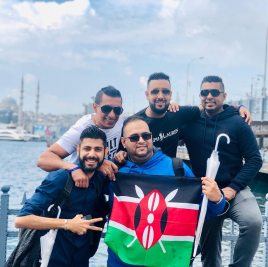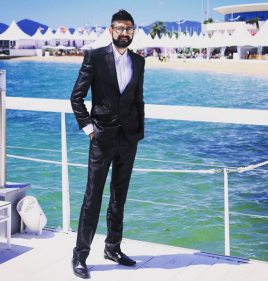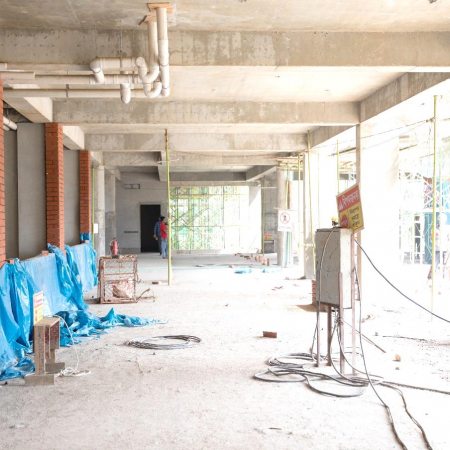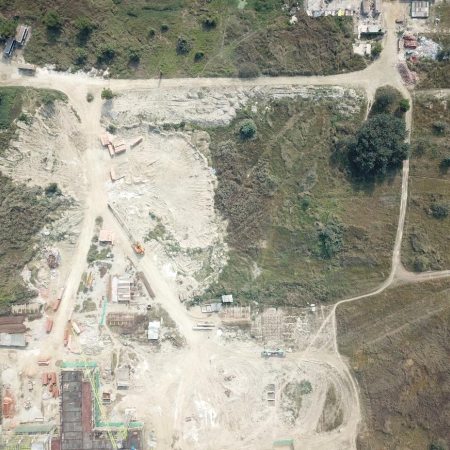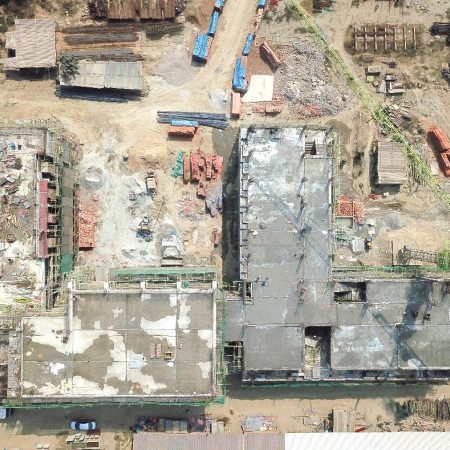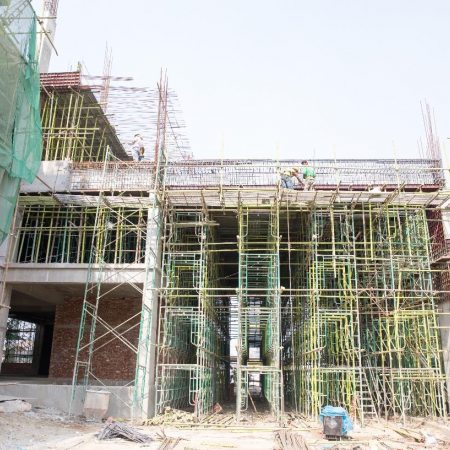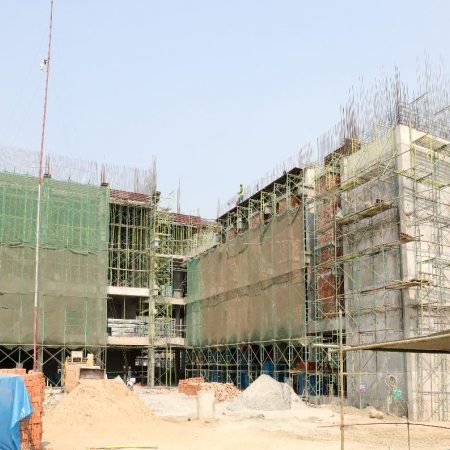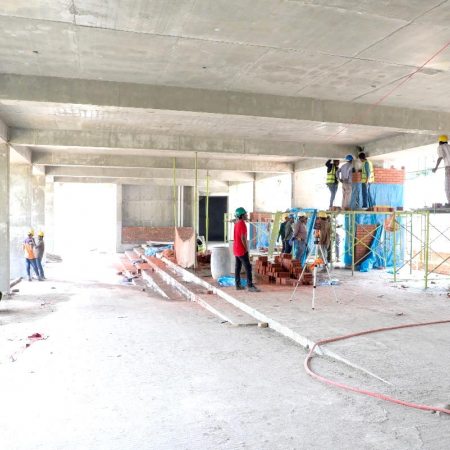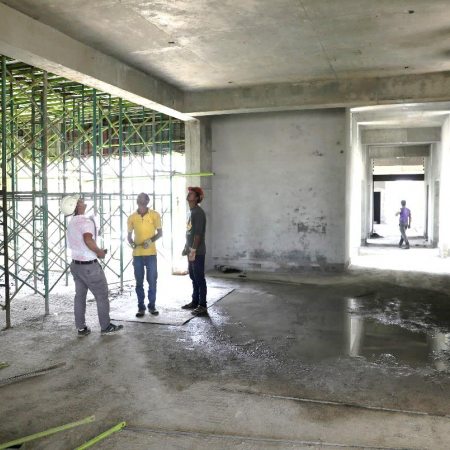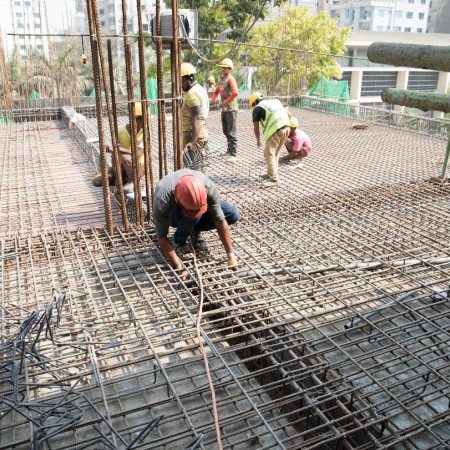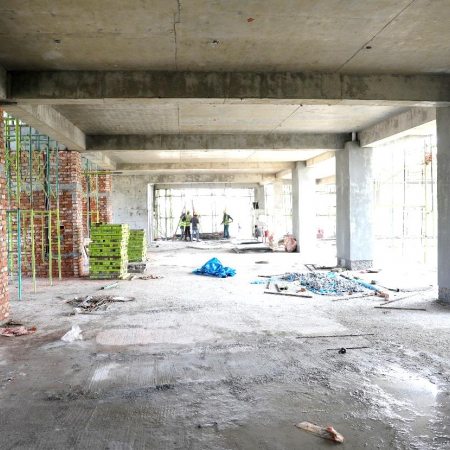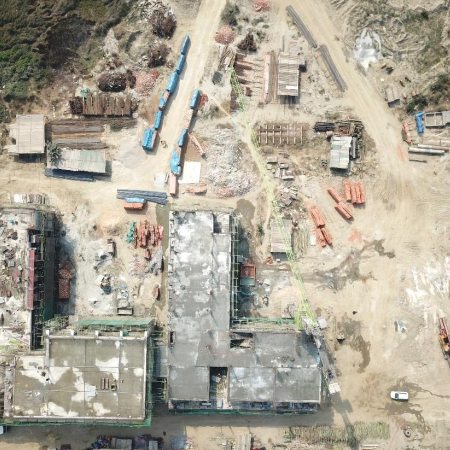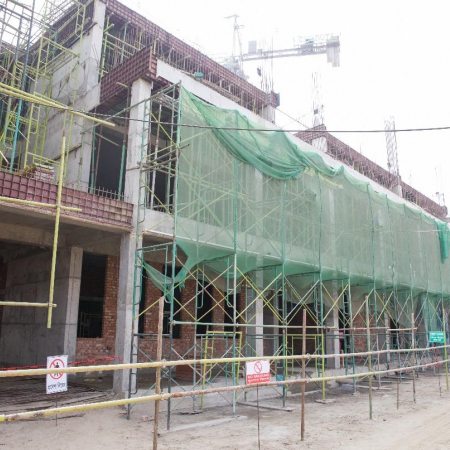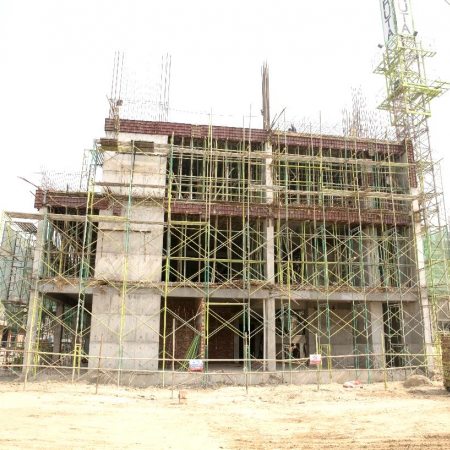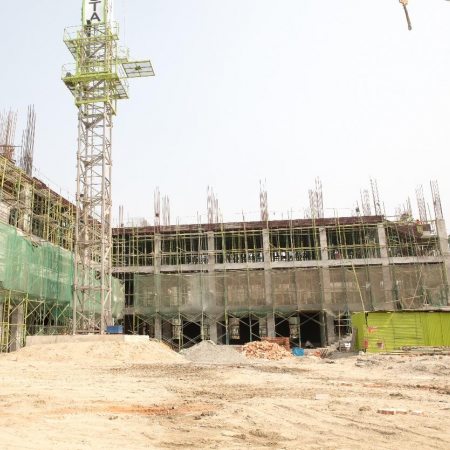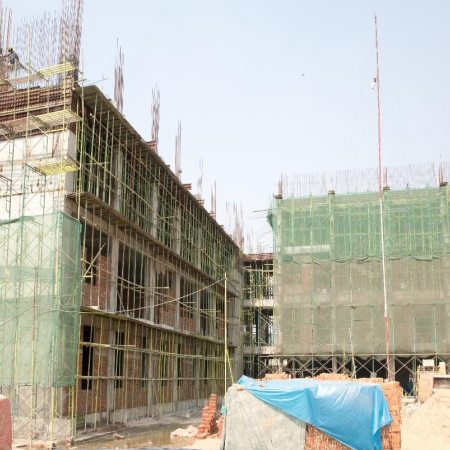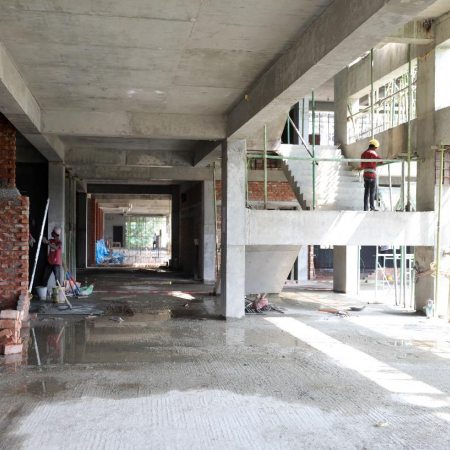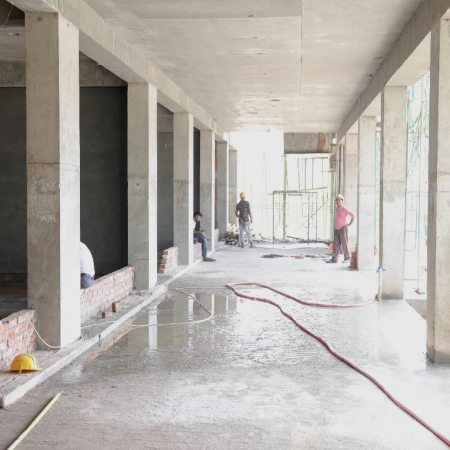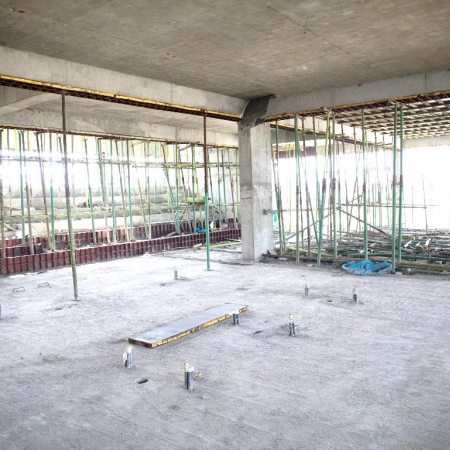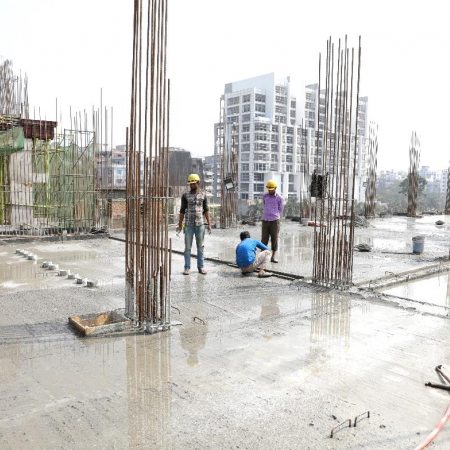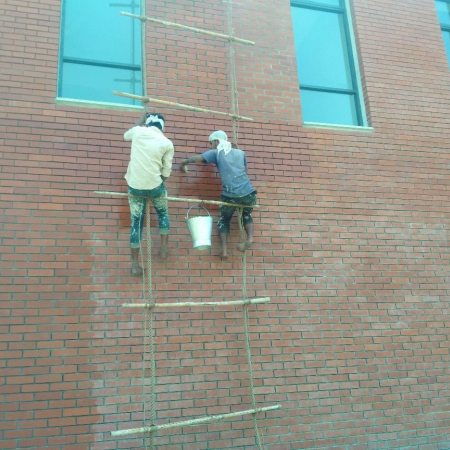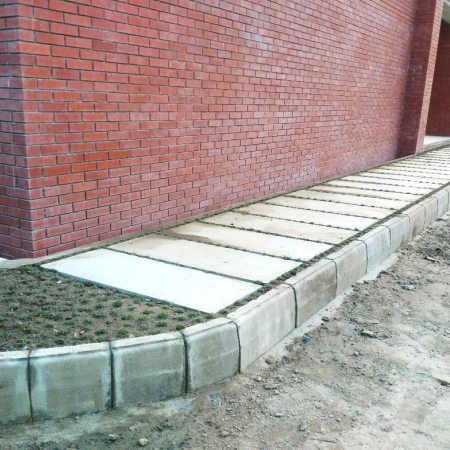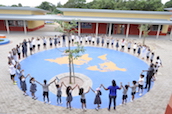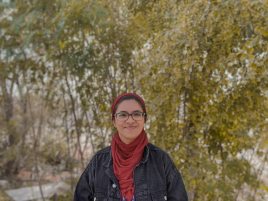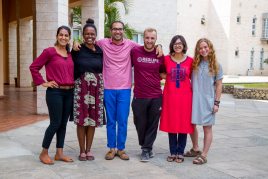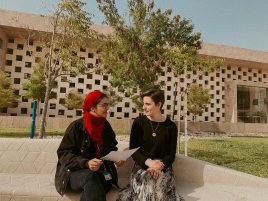IB Policies
These policies are mandated by the International Baccalaureate and guide the work we do at the Academy to implement the IB programme standards and practices.
Academic Integrity is a principle in education and a choice to act in a responsible way so others can trust us. It means conducting all aspects of academic life in a responsible and ethical manner. The policy details how we support this. Download the Academic Integrity Policy here.
The Admissions Policy outlines our requirements, expecttations, assessment and processes for students who wish to join the Academy. Download the Admissions Policy here.
AKA Maputo March construction update
The Aga Khan Academy Maputo's campus is growing as construction is ongoing and more state-of-the-art facilities are being completed. Check out the photo gallery below to see the latest photos of which facilities are complete and which are underway.
Visual Arts Educator Models Lifelong Learning
Vijayaraghavan Srinivasan is a prolific painter and video artist whose work explores the intersection between self and society. He facilitates IB Visual Arts at the Academy, in his words, “aimed at developing a strong formalistic and aesthetic understanding as a basis for unique personal expressions in my students. I believe the post-modernist approach to teaching Visual Arts enables students to rediscover the intelligence towards relationships by creating links with multiple disciplines and capitalise on imaginative novelty.”
Over the last decade, he has participated widely in various biennales, video festivals, and art residency programs across India and the world. This allows him to gain insights into contemporary art styles and enhance his pedagogical strategies in teaching art appreciation to promote creativity, critical thinking and encourage artistic independence along with a spirit of inquiry.
“For seven years,” Vijay tells us, “I have had the wonderful opportunity to instruct a diverse group of primary, middle and senior school students. I encourage and expect my students to be confrontational towards themselves as well as towards what they are seeing, to always question – never settle, and to be aware of the wonder that can be revealed by the creation of a work through honesty, passion and empathy.”
In 2016, Vijay’s piece The Trinity Saga was published by Aesthetica Magazine in the UK. The Aesthetica Artists Directory is a global network of artists engaging with the professional art world through forums for discussions and interactivity both in the print and digital spheres, where the best in emerging art from around the world has a chance to be discovered.
Proving that he embodies the philosophy of lifelong learning, in the summer of 2016 Vijay attended an advanced-level visual arts course at the Berlin Art Institute Studio Program, which is closely tied to the IB Diploma Programme art curriculum. The course work offered advanced-level studio art practice and experimentation with mixed media. “The avant-garde art practices and experiments with unconventional processes further enhanced my understanding of contemporary art practice,” says Vijay, “and focused on producing artwork in a transdisciplinary way, with compassion and responsibility as key themes.”
After the course, Vijay had the opportunity to work on a collaborative project with Kelly Reedy, an American experimental artist who specialises in art therapy. Labelled Under the Ageis, the mixed media video installation explored the archaic myth of Medusa in relationship to the primal aspects and duality of the ‘great mother’ and ‘terrible mother’ archetypes. Reedy’s research into psychological theories concerning the quality of the attachment of the primary care giver or “mother” in relation to the development of her child’s security and sense of self, accentuate her exploration of the transformative powers of the creative process in art to heal and make whole again.
“I encourage my students to develop a strong formalistic and aesthetic understanding of art as a basis for expressing their own personal vision,” says Vijay. “I encourage each of them to grow on their own, to be free to make mistakes, to push themselves in ways that their work takes them. I feel that self-directed education is inevitably the best way to guide young people in their education as students of art.”
Hussein Jiva (Class of 2009): A citizen of the world
Hussein Jiva graduated from the Aga Khan Academy Mombasa in 2009 after what he feels was a transformative journey.
If he is adamant about one thing, it is the notion that having an open mind allows for an individual’s personal and professional growth. The willingness to consider new ideas and listen to people whose thoughts may be different from one’s own allows one to embrace new possibilities to solve societal problems.Originally a resident of Mombasa, Hussein says it was his time at the Academy that forced him to examine his old thinking and rewrite a new chapter in his life.
“I remain a proud alumnus of the Aga Khan Academy Mombasa,” he states unwaveringly. “Given that the institution has had a huge impact in shaping my formative years.” Convinced that the Academy’s International Baccalaureate (IB) curriculum played a key role in his growth and personal development, he postulates it is the rigor of the curriculum that made him the person he is today.
“The IB curriculum education provided me with a well-rounded experience, anchored by values such as diversity, ethics, pluralism, leadership and open mindedness. On a social and cultural front, the pluralistic approach to education embraced by the Academy provided a strong foundation for me to build upon. It helped me in my journey to greater cultural understanding and tolerance, as I grew to appreciate differences in people from various backgrounds.”Hussein has a Bachelor’s Degree in Journalism and is currently pursuing a Master’s Degree in Communication Studies, with a focus on Digital Media at the United States International University–Africa in Nairobi.
Ruminating about his years at the Academy, Hussein recently spoke about how the Academy places enormous importance on its public service curriculum requisite. He feels this requirement gives students a higher purpose in life a belief that they can make a difference in the communities in which the live. Hussein’s cosmopolitan citizen-of-the-world way of thinking was borne out of this requisite.
“I recall participating in creativity, activity, service projects, one of the prerequisites to graduate from the Academy. On the surface, the concept is but a mere requirement. However, the esoteric essence of the practice provides for the development of a well-rounded individual who would ultimately contribute to the betterment of society beyond the academic sphere.”
As a journalist, Hussein has covered various local and international events including the Cannes International Film Festival from 2013 to 2016, the International Indian Film Academy Awards in 2017 and 2018 and the ICC Cricket World Cup in 2015 and ICC World T20 2016. He has also reported on momentous occasions such as Pope Francis’s visit to Kenya in 2015 and the Indian Prime Minister Narendra Modi’s visit also to Kenya in 2016.In addition, for almost eight years, Hussein worked at The Asian Weekly, a publication based in Nairobi with an East African circulation. He contributed to the Weekly as a Writer, Photographer and Sub-Editor. He later led the Sports Desk, and covering sports remains his passion.
“Sports commentary has been my area of interest, with football dominating my preferences. As such, I have written on both local and international sports, for media outlets beyond Kenya. My work has been published on portals in Nigeria, the United States and the United Kingdom. I have also been on a local television football show as a guest commentator.”
Asked what he would like to see happen in societies to make them more stable and better functioning, Hussien stated,
“Let us become instruments of change and alter the realities we face; let not challenges be viewed as obstacles to success but stepping stones toward it. After all, when you change the way you look at things, the things you look at will ultimately change.”
Calendar
Click here to download a copy of the 2024-2025 academic calendar.
Current Academic Year Calendar (2024-2025):
1st TERM / 1ºSEMESTRE
Event / Evento |
Date / Data |
| 1st term / 1º Semestre | 08/08/2024 - 13/12/2024 |
| Half-term break / Interrupção lectiva | 07/10/2024 - 18/10/2024 |
| Summer break / Férias de Verão | 16/12/2024 - 03/01/2025 |
2nd TERM / 2ºSEMESTRE
Event / Evento |
Date / Data |
| 2nd term / 2º Semestre | 07/01/2025 - 11/06/2025 |
| Half-term break / Interrupção lectiva | 31/03/2025 - 04/04/2025 |
| Long holidays / Férias longas | 16/06/2024 - 06/08/2025 |
| Public and other holidays/ Feriados e outras interrupções | Please refer to the detailed calendar. |
| Public and other holidays/ Feriados e outras interrupções | Por favor, consulte o calendário com detalhes. |
Living on Campus
Residential life at the Academy complements and extends the academic experience. The residential programme includes a broad selection of activities and leadership opportunities to enhance students’ learning and growth.
Our residential programme launched in April 2019, allowing students from across Mozambique to study at the Academy. Student residences are designed to accommodate students and dorm parents – teachers that have been chosen carefully and trained to live in the faculty apartments and student residences.
Up to four students share a room. The rooms are spacious with high ceilings and large windows. Facilities include a student lounge with IT facilities, wifi and a large-screen television along with laundry facilities.
The Commons building, when completed, will house the dining hall and an array of spaces for school activities. It will be the hub of student activity and serves as the main space for major school functions including music and drama performances and public lectures.
A photo gallery of the Aga Khan Academy Maputo Campus is available here »
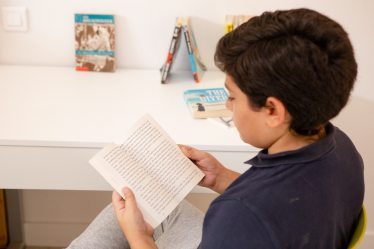 Learning beyond the classroom
Learning beyond the classroom
The culture of the Academy is based on respect, integrity, honesty, fairness, empathy and good humour. Our students, teachers and administrative staff create and sustain this positive learning environment.
The experience of our pluralistic learning community is especially rich for students in residence given the constant interactions among students, faculty and staff from diverse backgrounds.
The focus of the residential programme is on students’ intellectual, social, spiritual and physical growth in a structured and ethical environment. In the words of Aziz Batada, Head of the Residential Programme and Dean of Students at AKA Maputo, “The residential experience allows the typical school day – where the vision of the Aga Khan Academy is continuously being lived – to be extended, and education itself is seen as a part of every moment of an individual's life.”
Aga Khan Academy Dhaka Construction - February 2019
See our latest photo gallery and aerial drone footage showing progress on the construction of the Aga Khan Academy Dhaka – February 2019.
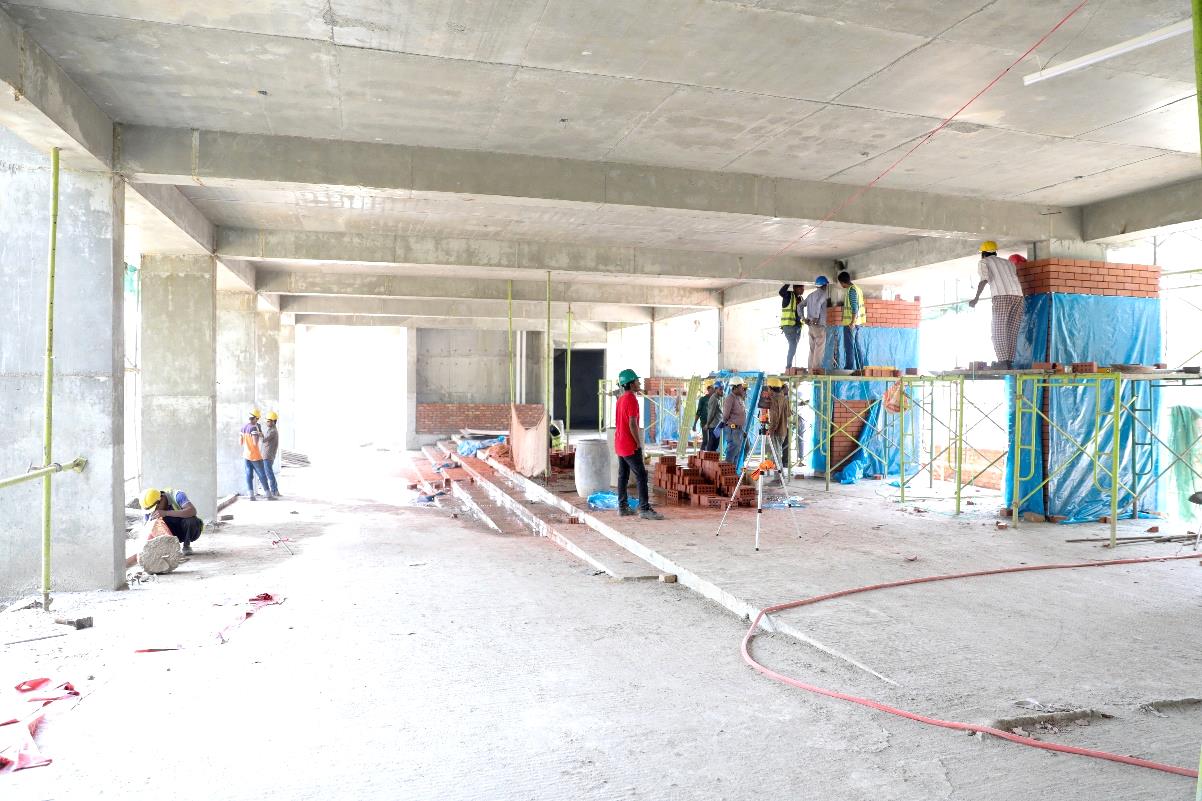
Happy New Year from the Aga Khan Academies
Dear friends of the Aga Khan Academies,
Happy New Year to you and your families from all of us at the Aga Khan Academies.
As we look toward 2018, I’m pleased to share with you some of the exciting developments that the Academies are anticipating for the coming year.
Across the Aga Khan Development Network, we will be continuing to celebrate the Diamond Jubilee of His Highness the Aga Khan, marking 60 years of his enlightened leadership as the Imam of the Ismaili Muslims and founder of the AKDN. The Jubilee commemorations began on 11 July 2017 and will continue until July 2018. The Aga Khan Academies have been running two social media initiatives in honour of the Diamond Jubilee – Academies ‘Journeys’ and ‘60 Stories for 60 Years’ – and these will continue through this July. I hope you are enjoying them.
The Jubilee year marks a time of increasing expansion of the Aga Khan Academies. Construction of the full campus for our third Academy in Maputo, Mozambique has proceeded rapidly, and our students and staff are looking forward to the opening of the beautiful new school buildings that will house students from grades 3–7 in the very near future. The Academy in Maputo also expanded their curricular offering this academic year, having introduced the International Baccalaureate (IB) Middle Years Programme, which has been received very well by our students and teachers.I’m also very pleased to share that our fourth Aga Khan Academy in Dhaka, Bangladesh will begin construction in 2018. The design for the forthcoming Academy won the award for best ‘Future Education’ project at the World Architecture Festival 2017. We’re looking forward to seeing the vision behind the award-winning design come to life, to provide talented students from Bangladesh and the region with a world-class education, regardless of their socioeconomic background.
In 2018 we will also be celebrating 15 years of the Aga Khan Academies network, with our first Academy in Mombasa, Kenya having opened in 2003. During the past 15 years, the Academies have pioneered innovative approaches in a multitude of areas, including the cross-curricular Aga Khan Strands, approaches to leadership development and service learning, campus design for a well-rounded education, talent identification, and developing local teachers into IB practitioners, amongst others. As our network grows, we are continuing to see the power of becoming a global, closely integrated and pluralistic learning community that allows sharing of ideas, expertise and thinking across varied contexts and cultures.
We greatly value your support for the Aga Khan Academies and our collective effort towards creating a better future through education.
Wishing you and your families the very best for 2018.
Warm regards,
Salim A.L. Bhatia
Director of Academies
Enquiry form
Enquiry Form - entry august 2013
Please complete the form below to help us get to know your family better. We will only use this information for enquiries and admissions purposes and will not distribute to any third parties.
Aleesha Suleman (Class of 2012): Dedicated and determined
At UCL- Qatar, Aleesha is completing a Master of Arts Degree programme in Museum and Gallery Practice. This programme, Aleesha says, “brings together my many loves – art, museums, culture, education, development and social justice.”
Aleesha also has a Bachelor of Science degree in Foreign Service from Georgetown University in Qatar. She notes that whenever she was studying, she never lost sight of her connection to Kenya.
“For one, whatever classes I took, I would find ways to connect my research back to Kenya, its history, its politics and its socio-economic issues. University classes related to the African continent would light a spark in me that made me realise how passionate I was about making a positive social change to the continent in whatever way I could,” she states.
Being admitted to the Academy was the beginning of a transformative journey for Aleesha. Coming from a more conservative background, it was a culture jolt initially. “I distinctly remember feeling the shock of a co-ed classroom for the first time and feeling like I would never be comfortable in the Academy’s school uniform.”
However, as Aleesha began to be exposed to a plethora of experiences, she adjusted quickly to her new life. She engaged in a number of extracurricular activities, including singing and playing musical instruments for the school band, hiking and mountain climbing through the President’s Award Programme. She also took on a leadership role within the growing residential programme as a Dorm Captain.
Following her graduation from Georgetown University, Aleesha returned to AKA Mombasa to become an Academy Fellow for two years. During this time, Aleesha worked as a mentor and residential parent to students, while also working in the Communications Department. Once her fellowship ended, Aleesha became the Communication Department’s official Communications Officer.Always a champion of social enterprise and progress, Aleesha started an organisation called Kreatives Konnect when she became a part of the Academy staff. The focus of the organisation is to provide opportunities for creatives in the coastal city of Mombasa to showcase their talents, network and collaborate with others, while also co-creating opportunities for development. Not only did the staff at the school back her in this endeavour, but the Academy students and the wider AKA community also helped her make this vision a reality.
“It made me feel very privileged to be part of such a community,” Aleesha recalls proudly. “I realised that just as the Academy supports students in making their ideas come to life, the school also supports all projects that impact the broader society.”
What does Aleesha envision she will do for Kenya?
“My long-term goal is to build high quality, accessible creative spaces in Kenya, specifically in my hometown of Mombasa. I hope to establish start-ups around this idea, incorporating the ground-work already started through Kreatives Konnect.”
A firm believer in the power of good art bringing about social change and moving communities forward, Aleesha says her goal is to work with artists to raise the level of development of the country in a sustainable manner. “I would like to work on creating cultural policy and instituting cross-cultural collaborative programs that would revolutionise the creative industry, not just at a local level in Mombasa, Kenya, but also at a regional and international scale.”
Aleesha recently worked on an interactive online exhibition with her Museum and Gallery Practice colleagues. It is titled Umoumah: Becoming a Mother and takes the visitor on a journey through pregnancy and motherhood, especially focusing on how the mother can be supported by loved ones and most importantly, herself. Aleesha sees this project as a crucial learning experience in how support and positive social change can be achieved through digital platforms. “Especially now with COVID-19, we’re all having to find alternative ways of communicating and connecting with others, and having a fully online exhibition is simply a testament to that. It opens up a lot more cross-border avenues for the future that transcend physical constraints.”Aleesha has fondly come to regard the Academy as her second home. Reminiscing about her period at the Academy, she offers a bit of advice to current Academy students.
“Be highly proactive. Do your research. Learn about yourself. Keep your options open and stop letting other people define the next steps of your life. Don’t be lazy about this process because it defines the next few years of your life. No one is going to just hand you things – you have to work for it. There are lots of amazing young people around the world who are deserving (especially if you’re looking for scholarships) You have to show the admissions team why you are unique, but there has to be evidence to show this. This evidence comes through your active and consistent participation in the activities and causes you truly care about.”